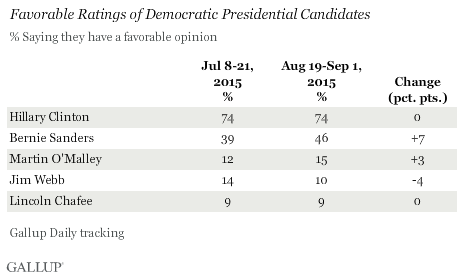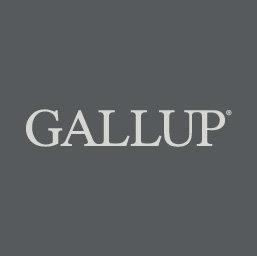Story Highlights
- Forty-one percent have a favorable view of Clinton
- Lowest favorable rating since husband's 1992 presidential bid
- Clinton maintains strong favorable ratings among Democrats
WASHINGTON, D.C. -- Dogged by continued scrutiny of her email practices as secretary of state, Democratic presidential candidate Hillary Clinton's favorability with the American public has sunk to one of its lowest levels in Gallup's 23-year trend. Currently, 41% of U.S. adults say they have a favorable opinion of the Democratic front-runner, while 51% hold an unfavorable view.

Clinton's deflated favorable rating reflects the challenging political environment she has faced recently. Her use of a private server and email account as secretary of state remains an ongoing controversy and has prompted congressional and FBI investigations.
Clinton's sub-40% favorable ratings in 1992 were mostly a product of the public's lack of familiarity with her, rather than any kind of broad unpopularity. By contrast, her current 41% favorable rating is arguably her worst, given her nearly universal name recognition. Her present rating is about as low as it was in March 2001, during her first few months in office as a U.S. senator from New York. Perhaps more importantly, it was also after controversial pardons that her husband, President Bill Clinton, granted at the end of his presidency, and after the Clintons took furnishings and other gifts that were White House property when they left.
More generally, since Clinton emerged as a public figure in 1992, her favorability peaked at 67% in December 1998 after President Clinton was impeached, and waned in the years thereafter -- bottoming out at 44% after the Clintons left the White House. Her favorability improved somewhat during her time in the Senate, reaching as high as 58% in 2007, just after she announced her first bid for the presidency.
As secretary of state in Barack Obama's administration, her favorability rating never fell below 60%. But upon leaving her cabinet post and returning to the political fray, Clinton saw her marks begin a downward slide, hastened by reports about her private email server earlier this year. In particular, her favorable ratings have come full circle among independents and Republicans, ultimately falling this year to the unflattering levels she received during her first presidential campaign.
Democrats Remain Steady in Support
Clinton's diminishing popularity with national adults notwithstanding, she remains well-liked among Democrats and independents who lean Democratic -- the key audience she needs to appeal to in a Democratic primary. For the two-week period ending Sept. 1, 74% of Democrats had a favorable view of Clinton, the same as when Gallup began tracking these data on a daily basis in early July.

Clinton remains much better liked among Democrats than any of her current competitors for the nomination. Forty-six percent of Democrats view Bernie Sanders -- currently seen as Clinton's most formidable challenger -- favorably, an improvement from the 39% he scored July 8-21. The other three announced Democratic candidates -- Martin O'Malley, Jim Webb and Lincoln Chafee -- have paltry favorable ratings among party supporters that have, to date, shown no signs of improving.
Bottom Line
As Clinton continues to field inquiries from the media and government into her email use as secretary of state, her favorable rating among national adults has fallen to near-record lows. But she remains generally liked among Democrats themselves, so it is still an open question as to whether media reports of her email situation will have an effect on her ability to obtain the Democratic presidential nomination.
Nonetheless, if Clinton's national image problem persists, this may cause concern for Democratic voters looking to back a nominee who can win the general election. At the moment, Sanders appears to be alone among Clinton's current cadre of opposing contestants in showing signs of an increased positive position in Democrats' minds, and he remains unknown to almost half of Democrats nationwide. This development may seem inviting for other potential candidates, such as Vice President Joe Biden.
Survey Methods
Results for this Gallup poll are based on telephone interviews conducted Aug. 19-Sept. 1, 2015, on the Gallup U.S. Daily survey, with a random sample of up to 1,000 U.S. adults identifying as Democrats or independents who lean Democratic, aged 18 and older, living in all 50 U.S. states and the District of Columbia. Each candidate was rated by a random subset of respondents during this period, with the sample sizes rating each candidate ranging from 889 to 968. For results based on these samples, the margin of sampling error is ±6 percentage points at the 95% confidence level.
Each sample of national adults includes a minimum quota of 50% cellphone respondents and 50% landline respondents, with additional minimum quotas by time zone within region. Landline and cellular telephone numbers are selected using random-digit-dial methods.
Learn more about how Gallup Daily tracking works.

